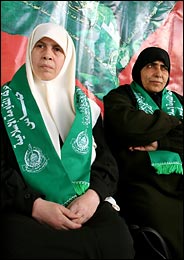Blame it on the Women
Apparently women made up a massive block of swing voters for Hamas in the last election in the Palestinian territories, according to Ian Fisher for the NYTimes.Reem Abu Athra, who directs women's affairs in the Fatah youth wing, said that her party did not seem to understand how mobilized Hamas's women were generally — and that it did not match the grass-roots work by Hamas women during the elections. She said that Fatah seemed to think it would naturally win the women's vote, as the more secular party that has been in some ways a leader in the Arab world in rights for women.The model of women under Hamas will, of course, be Islam - sharia law to the extent that the new government can implement it in the territories. Which, from the point of view of according women more rights -as understood in a non-religious and Western sense, will represent a setback for women in the territories.
"Fatah took women for granted, and this is one reason it lost," she said.
The questions now seem to be what role Hamas's women will play, and exactly how that will be expressed in the rules of Islam.
Mariam Farhat, left, beside Jamila
al-Shanty at a rally in Gaza City.

The best known among the 6 women who won seats in the Hamas parliament is Mariam Farhat, notoriously mother to three sons whom she merrily sent off to become suicide bombers. Of this event, she has said that she wished she had 100 sons to sacrifice that way. And for that, she is loved as heroine and mother to the people, who voted her into office.
"She is a mother to every house, every person," said one of the students, Reem el-Nabris, 20, who kissed and hugged Ms. Farhat.
Ms. Farhat, 56, who had not been active in politics, said she hoped she deserved their praise as a role model. But she said her role should not be the only one for Hamas's women.
"It is not only sacrificing sons," she said after the rally. "There are different kinds of sacrifice, by money, by education. Everybody, according to their ability, should sacrifice."
Another example of a woman elected to the parliament is Mouna Mansour:
In an interview before she won a legislative seat, Mouna Mansour, 44, a physics teacher and widow of Jamal Mansour, an assassinated Hamas leader, seemed very much engaged in the central issues. The peace process with Israel, she said, was dead. There should be a Palestinian state, but not at the cost of Jerusalem or the claims of Palestinian refugees, who under previous negotiations would not be permitted to move into what is today Israel.
Hamas, she said, needs to rebuild the economy, get rid of poverty and unemployment and, for now, to continue the cease-fire with Israel.
In other words, Hudna, until we are strong enough to build our strength back up. And then the jihad.
This seems a fitting epitaph, stated by one Hamas voter:
"A lot of Palestinians love Hamas and wanted them," she said. "But we don't know what will happen."And neither unfortunately do the rest of us.
But won't it be fun while we wait and see.







0 Comments:
Post a Comment
<< Home